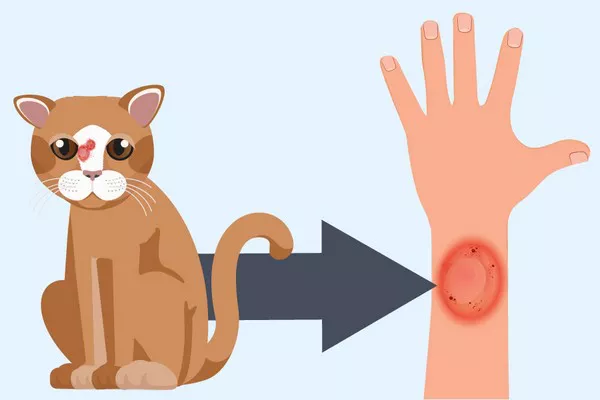Ringworm, despite its name, is not caused by a worm but rather by a fungus. This fungal infection is a common ailment affecting the skin, scalp, and nails. Despite its prevalence, there exists a misconception regarding its nature, leading many to believe that ringworm is indeed caused by a worm. In this comprehensive article, we delve into the depths of ringworm, uncovering its true nature as a fungal infection and exploring its implications on skin health.
Understanding Ringworm: The Fungal Culprit
Ringworm, medically termed dermatophytosis, is caused by various types of fungi known as dermatophytes. These fungi thrive in warm, moist environments, making areas such as the skin, scalp, and nails susceptible to infection. Contrary to popular belief, ringworm does not involve any parasitic worms. Instead, it manifests as a circular or ring-shaped rash on the skin, often accompanied by itching, redness, and scaling.
Types of Ringworm Infections
Ringworm can affect different parts of the body, leading to distinct types of infections:
1. Tinea Corporis: This type of ringworm affects the body’s skin, causing red, scaly patches that may itch or burn. It commonly occurs on areas of the body other than the scalp or feet.
2. Tinea Capitis: Ringworm of the scalp, known as tinea capitis, primarily affects children. It can lead to hair loss and may appear as a scaly, itchy rash on the scalp.
3. Tinea Pedis: Commonly referred to as athlete’s foot, tinea pedis affects the feet, particularly the spaces between the toes. It can cause itching, burning, and peeling of the skin.
4. Tinea Cruris: Also known as jock itch, tinea cruris affects the groin area, leading to a red, itchy rash that may spread to the inner thighs and buttocks.
5. Tinea Unguium: This type of ringworm affects the nails, causing them to become thick, discolored, and brittle. It is commonly seen in toenails but can also affect fingernails.
Transmission and Risk Factors
Ringworm is highly contagious and can spread through direct contact with infected individuals or contaminated surfaces such as towels, clothing, and sports equipment. Factors that increase the risk of ringworm infection include:
Close contact with infected individuals, especially in crowded environments such as schools and gyms.
Sharing personal items such as clothing, towels, and hairbrushes with infected individuals.
Walking barefoot in public areas such as locker rooms, swimming pools, and communal showers.
Compromised immune system, as seen in individuals with conditions such as HIV/AIDS or diabetes.
Poor hygiene practices, including infrequent handwashing and inadequate skin care.
Diagnosis and Treatment
Diagnosing ringworm typically involves a physical examination of the affected area and may include a skin scraping or biopsy to confirm the presence of fungal infection. Treatment options for ringworm vary depending on the location and severity of the infection. Common treatment modalities include:
1. Topical Antifungal Medications: Over-the-counter antifungal creams, lotions, or powders containing ingredients such as clotrimazole, miconazole, or terbinafine are often effective in treating mild cases of ringworm.
2. Oral Antifungal Medications: In cases of severe or widespread infection, oral antifungal medications such as fluconazole or griseofulvin may be prescribed by a healthcare provider.
3. Medicated Shampoos: For ringworm of the scalp, medicated shampoos containing antifungal agents such as ketoconazole or selenium sulfide may be recommended to eliminate the fungus from the hair and scalp.
4. Home Remedies: Some individuals may opt for home remedies such as tea tree oil, apple cider vinegar, or garlic paste to alleviate symptoms and promote healing. However, it’s essential to consult with a healthcare professional before attempting any home treatment to ensure safety and effectiveness.
In addition to pharmacological interventions, practicing good hygiene habits can help prevent the spread and recurrence of ringworm. These habits include:
Keeping the affected area clean and dry.
Avoiding sharing personal items such as clothing, towels, and grooming tools.
Washing hands thoroughly after touching or treating the infected area.
Wearing clean, breathable clothing and changing socks and underwear daily.
Disinfecting surfaces and objects that may come into contact with the fungus.
Preventing Ringworm: Tips for Maintaining Skin Health
While ringworm is a common and treatable condition, taking proactive measures to prevent its occurrence is paramount. Here are some tips for maintaining optimal skin health and reducing the risk of ringworm infection:
1. Practice Good Hygiene: Regularly bathe or shower using soap and water to keep the skin clean and free from dirt, sweat, and excess oil. Pay particular attention to areas prone to moisture buildup, such as the groin, armpits, and feet.
2. Keep Skin Dry: Moisture provides an ideal environment for fungal growth, so it’s essential to keep the skin dry, especially in areas susceptible to sweating. Dry thoroughly after bathing or swimming, and consider using talcum powder or antifungal powder in areas prone to moisture.
3. Avoid Sharing Personal Items: Refrain from sharing clothing, towels, hairbrushes, and other personal items with others, particularly if they have a known fungal infection. This can help prevent the spread of ringworm and other contagious skin conditions.
4. Wear Appropriate Footwear: When in communal areas such as locker rooms, swimming pools, or public showers, wear protective footwear such as flip-flops or shower shoes to reduce the risk of fungal exposure.
5. Maintain a Healthy Lifestyle: A balanced diet rich in vitamins and nutrients can support overall skin health and bolster the immune system, reducing the likelihood of fungal infections.
6. Seek Prompt Treatment: If you suspect you have ringworm or any other skin infection, seek prompt medical attention from a healthcare professional. Early diagnosis and treatment can help prevent the spread of infection and minimize discomfort.
Conclusion
In conclusion, ringworm is indeed a fungal infection rather than a parasitic infestation as its name might suggest. Understanding the true nature of ringworm is crucial for effective prevention, diagnosis, and treatment. By practicing good hygiene habits, seeking timely medical intervention, and taking proactive measures to protect skin health, individuals can minimize the risk of ringworm and enjoy healthier, happier skin.

























